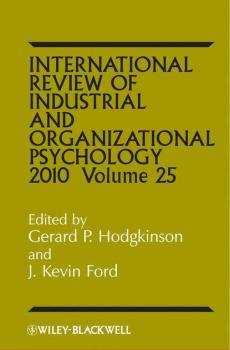Общая психология
Различные книги в жанре Общая психологияInternational Review of Industrial and Organizational Psychology, 2002 Volume 17
This is the seventeenth in the most prestigious series of annual volumes in the field of industrial and organizational psychology. The series provides authoritative and integrative reviews of the key literature of industrial psychology and organizational behavior. The chapters are written by established experts and topics are carefully chosen to reflect the major concerns in the research literature and in current practice. This seventeenth volume will continue to provide coverage of emergent issues such as: Coping with Job Loss: A Life-Facet Perspective; The Older Worker in Organizational Context; Employment Relationships from the Employer's Perspective; Great Minds Don't Think Alike?: Past, Present and Future of Cross-Cultural Studies in Industrial and Organizational Psychology; Executive Health; The Influence of Values in Organizations; New Research Perspectives and Implicit Managerial Competency Modelling in China Each chapter offers a comprehensive and critical survey of a chosen topic, and each is supported by valuable bibliography. For advanced students, academics, and researchers, as well as professional psychologists and managers, this remains the most authoritative and current guide to developments and established knowledge in the field of industrial and organizational psychology.
International Review of Industrial and Organizational Psychology, 2009 Volume 24
The 24th volume in this prestigious series of annual volumes, the International Review of Industrial and Organizational Psychology 2009 includes scholarly, thoroughly researched, and state-of-the-art overviews of developments across a wide range of topics in industrial and organizational psychology. An international team of highly respected contributors reviews the latest research and issues in the field with eight chapters supported by extensive bibliographies. This volume is ideal for organizational psychologists, MSc level students in organizational psychology, and researchers seeking literature on current practice in industrial and organizational psychology.
International Review of Industrial and Organizational Psychology, 2010 Volume 25
This is the twenty-fifth volume in the most prestigious annual series for the field of industrial and organizational psychology. Continuing the tradition of providing scholarly, up-to-the-minute reviews and updates of theory and research, this volume surveys developments in such familiar areas as employee selection, team cognition and adaptation, leadership, and diversity management. Newer topics include corporate communications, coaching, and positive organizational behavior. Each chapter offers a comprehensive and critical survey of the topic and is supported by a valuable bibliography.
International Review of Industrial and Organizational Psychology, 2004 Volume 19
This is the nineteenth in the most prestigious series of annual volumes in the field of industrial and organizational psychology. The series provides authoritative and integrative reviews of the key literature of industrial psychology and organizational behaviour. The chapters are written by established experts and topics are carefully chosen to reflect the major concerns in the research literature and in current practice. This volume provides both reviews and current updates of research in familiar areas, such as Learning and Development at Work, Creating Healthy Workplaces, Empowerment and Performance, and Team Effectiveness. Newer topics are also included, such as Virtual Teams, the Workplace Experiences of Lesbian and Gay Employees, and Identification in Organizational Contexts. Each chapter offers a comprehensive and critical survey of the chosen topic, and each is supported by a valuable bibliography. For advanced students, academics, and researchers, as well as professional psychologists and managers, this remains the most authoritative and current guide to developments and established knowledge in the field of industrial and organizational psychology.
International Review of Industrial and Organizational Psychology, 2007 Volume 22
This is the twenty-second in the most prestigious series of annual volumes in the field of industrial and organizational psychology. The series provides authoritative and integrative reviews of the key literature of industrial psychology and organizational behaviour. The chapters are written by established experts and topics are carefully chosen to reflect the major concerns in both the research literature and in current practice. As in previous works in the series, this twenty-second volume provides scholarly, up to the minute reviews and updates of theory and research, covering developments across a wide range of established areas and emerging issues, including: socialization in organizational contexts, assessing the costs and benefits of human resources, strategies for reducing work-family conflict, coping research and measurement in the context of work related stress, and conducting applied research in a changing world of work. Each chapter offers a comprehensive and critical survey of the chosen topic, and each is supported by a valuable bibliography. For advanced students, academics and researchers, as well as professional psychologists and managers, this remains the most authoritative and current guide to new developments and established knowledge in the field of industrial and organizational psychology.
The International Handbook on Psychopathic Disorders and the Law
Reflecting the work of an international panel of experts, the International Handbook on Psychopathic Disorders and the Law offers an in-depth and multidisciplinary look at key aspects of the development and etiology of psychopathic disorders, current methods of intervention, treatment and management, and how these disorders impact decision making in civil and criminal law.
The International Handbook on Psychopathic Disorders and the Law, Volume II
Reflecting the work of an international panel of experts, the International Handbook on Psychopathic Disorders and the Law offers an in-depth and multidisciplinary look at key aspects of the development and etiology of psychopathic disorders, current methods of intervention, treatment and management, and how these disorders impact decision making in civil and criminal law.
Clinician's Guide to Treating Stress After War
Clinician's Guide to Treating Stress After War: Education and Coping Interventions for Veterans outlines clear strategies that mental health professionals can use to help war returnees become better able to negotiate common problems that diminish the quality of their day-to-day life. A powerful and practical resource, this guide assists professionals to increase each individual's sense of control over his or her life.
Psychological Approaches to Rehabilitation after Traumatic Brain Injury
The psychological effects of traumatic brain injury (TBI) provide a major challenge to rehabilitation services. This text will increase understanding of the nature of these effects and provide practical guidance from experienced practitioners about psychological interventions for use in both rehabilitation and long-term adjustment. Provides practical guidance and illustrative case examples from experienced practitioners. Structured around five main areas: overview of psychological effects and services; cognitive rehabilitation; managing emotional and behavioural problems; vocational rehabilitation; and family impact and interventions.
Cognitive-Behavioural Therapy in the Treatment of Addiction
Treating individuals with a substance misuse problem can be challenging, especially if clients present with multiple problems related to the main addiction. Clinicians can feel at a loss as to where to begin, or revert to an attempt to treat underlying problems – ignoring damaging aspects of the substance misuse itself. At times referral to specialists may seem the only responsible way forward. Written by a team of clinical academics in the field of addictions, Cognitive-Behavioural Therapy in the Treatment of Addictions is a ready reference for clinicians that offers a brief, evidence-based, collaborative approach that starts here and now. Client and therapist embark together on a journey to tackle the problem in a practical way. The book includes session tools, worksheets and daily thought records.









